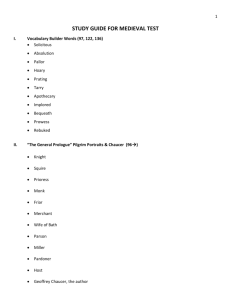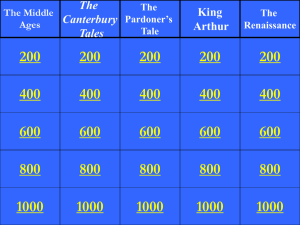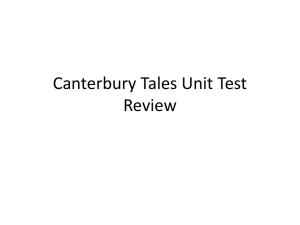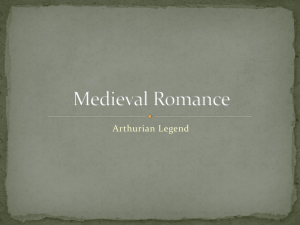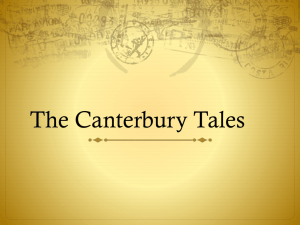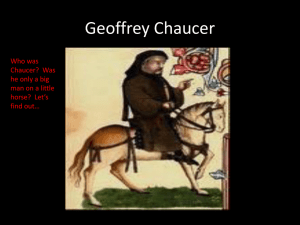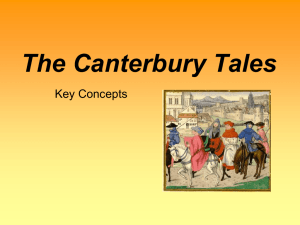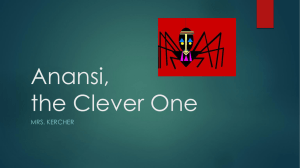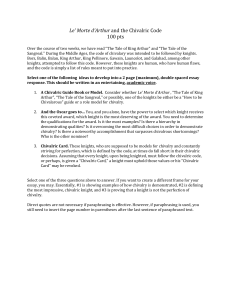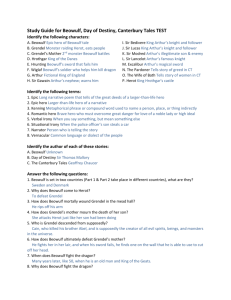study guide for medieval unit test: english 4
advertisement
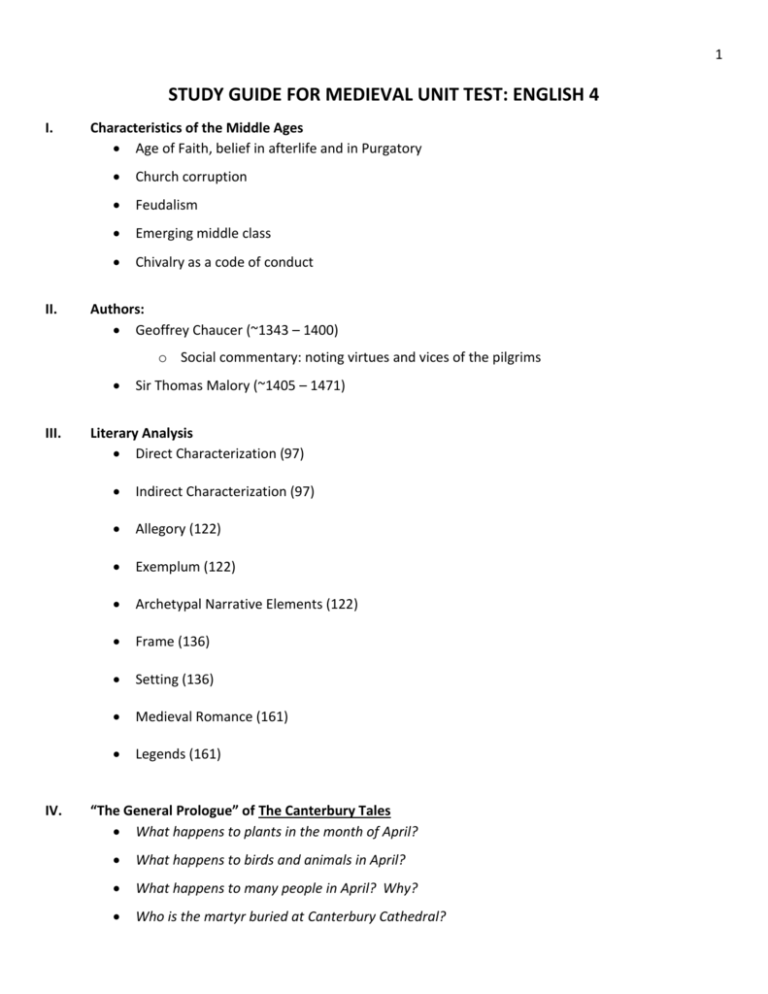
1 STUDY GUIDE FOR MEDIEVAL UNIT TEST: ENGLISH 4 I. II. Characteristics of the Middle Ages Age of Faith, belief in afterlife and in Purgatory Church corruption Feudalism Emerging middle class Chivalry as a code of conduct Authors: Geoffrey Chaucer (~1343 – 1400) o Social commentary: noting virtues and vices of the pilgrims III. IV. Sir Thomas Malory (~1405 – 1471) Literary Analysis Direct Characterization (97) Indirect Characterization (97) Allegory (122) Exemplum (122) Archetypal Narrative Elements (122) Frame (136) Setting (136) Medieval Romance (161) Legends (161) “The General Prologue” of The Canterbury Tales What happens to plants in the month of April? What happens to birds and animals in April? What happens to many people in April? Why? Who is the martyr buried at Canterbury Cathedral? 2 V. What is the name of the inn from which the pilgrims stay before leaving for the pilgrimage? Who owns this inn? Knight Squire Prioress Monk Friar Merchant Wife of Bath Parson Miller Pardoner Host: Harry Bailley Why does Chaucer say he must repeat each pilgrim’s tale as closely as he can remember it, even if the tale is bad? What are the two conditions of the tale-telling contest? Who will be the judge? “The Pardoner’s Prologue and Tale” (124) What is the genre of this story? What kind of man is the Pardoner, and how do we know? What does the phrase “Radix malorum est cupiditas” mean? (124) What is the problem at the beginning of this tale, and how do the main characters plan to solve it? What distracts the men from their purpose? Why? 3 VI. Whom does the Old Man say that he has never found? Where does the Old Man say that the men can find Death? What is ironic about the answer to the above question? Why do the men plan on killing each other? How do the men plan on killing each other? At the end of his tale, what does the Pardoner try to get the pilgrims to do? Why is this effort ironic? In what way is this tale an allegory? What are the archetypal narratives present in this tale? “The Wife of Bath’s Tale” What was the name of the Wife’s fifth husband? (137) Why does the Wife bother to tell us that no more fairies roam the country anymore? What is the genre of the Wife’s tale? What is ironic about the way this genre is used by the Wife? What is the setting of this tale? What expectations do we have of a tale set in this king’s court? Why? What crime does the knight commit at the beginning of the tale? Why is this ironic? Why does King Arthur allow his wife, Queen Guinevere, to be the judge of the knight’s crime? What test does she set for the knight? What is the purpose of telling the tale-within-a-tale about King Midas? Why is it ironic that this tale is told? Who gives the knight the answer to the question he needs answered? What does he promise to give in return? What three reasons does the knight give for not wanting to be married to his new wife? According to the Old Woman, what is true virtue and what is virtue not? How does the Old Woman defend the state of poverty? How does the Old Woman defend the state of being old and ugly? What two choices does the Old Woman give the knight? What choice does the knight make? 4 VII. What happens as a result of the knight’s choice? What is the theme of this tale? What curse does the Wife of Bath make on husbands who won’t give their wives sovereignty? What is sovereignty? from Morte d’Arthur (176) What is the genre of this story? Describe Arthur’s first dream? What does it signify/foreshadow? Describe Arthur’s second dream? What does it foreshadow? What does Arthur do in response to the second dream to avoid his death day? What happens on this day that suggests it may be Arthur’s destiny to die then? How many men are in Mordred’s army? Who is Mordred? At the end of the battle, how many men are left on each side? Who are they? What decision does Arthur make at the end of the battle that suggests it was not destiny that he die on that day? What is happening on the field after the great battle where so many men died? How do these circumstances affect Arthur’s decision regarding Excalibur? How do we know that Sir Lucan is loyal to Arthur? How many times does Arthur tell Sir Bedivere to throw Excalibur in to the lake? Why doesn’t Bedivere do this the first two times? How does Arthur know Bedivere hasn’t followed his orders? What happens when Bedivere does follow the orders the third time? Who comes for the dying Arthur? Whom does Bedivere meet in the woods? What important position did this man used to have? How does Bedivere prove his loyalty to Arthur at this point? What does HIC IAET ARTHURUS, REX QUONDAM, REXQUE FUTURUS mean?
